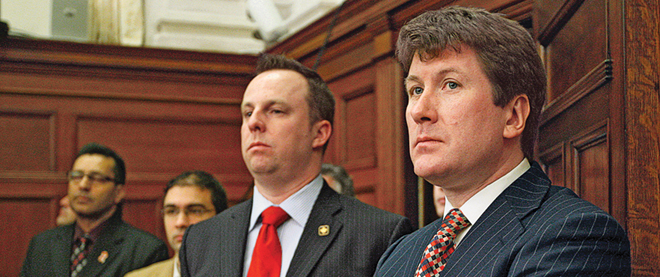As the privacy fight turned ugly, democracy made a comeback
While a certain amount of electronic surveillance is justified, the possibility that such information could be made available without a warrant should be of concern to every Canadian
Chris Wattie/Reuters
Share

Public Safety Minister Vic Toews has long been seen as the bluntest tool wielded by the Harper government in its misguided law-and-order campaign. Last week, we found out just how blunt, and misguided.
Bill C-30, also known as the “Protecting Children from Internet Predators Act,” provoked a storm of political and public debate across the country due to a provision that allows police to gain access to any Internet subscriber’s IP address (among other identifiers) in order to track their online activity. This would be permitted without a warrant in “extraordinary circumstances.”
While a certain amount of electronic surveillance is justified in the interests of peace, order and good government, the possibility that such information could be made available without a warrant should be of concern to every Canadian with Web access. Approval from a judge is required before Canadian authorities can obtain someone’s personal financial information; why should electronic details be treated differently?
Unfortunately, the federal government’s instincts on law and order have become exaggerated and doctrinaire. Toews’s initial reaction was to meet legitimate concerns with baseless accusations. His now-infamous rejoinder was that critics had a choice to “either stand with us, or with the child predators.” This is in keeping with Toews’s over-the-top approach to crime that dates back to his days as attorney general in Manitoba. As justice minister in Prime Minister Stephen Harper’s first cabinet, Toews once mused about putting 10-year-olds in jail.
As the current debate lengthened, however, it became apparent Toews was not just being strident. It seemed he’s overlooked the significance of his own bill. This past weekend, under questioning from CBC-TV’s Evan Solomon on warrantless searches, Toews replied, “I’m not familiar with that framing of the issue.” His exchanges during question period contributed to the sense that he’s either unaware or uninterested in the bill’s proposal to do away with warrants.
Unfortunately, some opponents of the bill have been just as misguided in their response. Champions of Internet freedom attempted to link legitimate criticisms of C-30 with embarrassing details from Toews’s private life. One online threat from the group Anonymous, done up in their V for Vendetta style, warns, “We know all about you, Mr. Toews … and we will release what we have unless you scrap the bill and step down as public safety minister.”
So we have a worrisome bill defended by a poorly informed and unnecessarily combative minister who is now being attacked by a rabble of juvenile blackmailers.
Thankfully, there is a measure of good news to be found in all this.
While it’s to be expected that privacy advocates and Internet hotheads would be vocal in attacking the bill, complaints have been heard from some unusual quarters. Rookie backbench Conservative MP John Williamson of New Brunswick, for example, risked his neck last week arguing the bill “is too intrusive as it currently stands and does need to be looked at.” Calgary MP Rob Anders and rural Ontario MP David Tilson also expressed concerns. It seems a brave show of opposition from within the Conservative caucus, particularly given the importance the Harper government places on loyalty and adherence to speaking notes.
Then again, protection of online privacy was once a core Conservative value. As Macleans.ca blogger Jesse Brown has pointed out, former Conservative public safety minister Stockwell Day categorically rejected the notion of warrantless searches when this bill was his responsibility in 2007. And it’s worth noting the bill made its first appearance courtesy of Paul Martin’s Liberal government in 2005. The new Conservative version has reduced by half the personal identifiers police may access, with or without a warrant.
Given the widespread outcry, the Harper government—majority status notwithstanding—now seems to understand there are limits to public acceptance of its tough-on-crime platform. Late last week, Toews made the unusual move of putting his bill up for amendment in the House of Commons at an early stage; he also offered something resembling an apology for his remarks linking critics with child predators.
What needs to happen next? It is certainly not necessary to scrap the entire bill, as some claim. Reasoned observers, including University of Ottawa law professor Michael Geist, readily admit police surveillance over electronic communications is a necessary tool for fighting crime in our modern era. And there may be exceptional circumstances when time is of the essence. In such situations, Geist recommends an expedited warrant system that still retains judicial oversight. It seems a practical solution.
Despite fears to the contrary, Ottawa has taken notice of public criticism. Backbench MPs are speaking their minds. A political compromise may be in the offing. Canadian democracy, it seems, is still functioning.